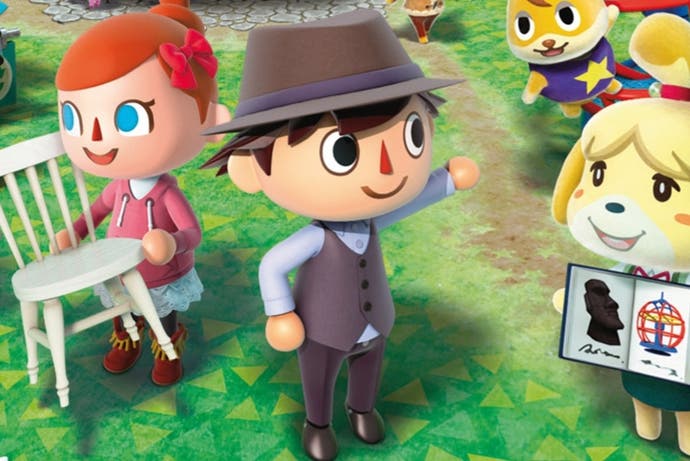My Animal Crossing wish: can we have the grid system back?
Permanently Spiked?
Animal Crossing is, like Tetris, a game that is constantly evolving in quiet ways while seeming - superficially and to outsiders - to be a game that never changes at all. Holding a piece, the instant drop, even the number of pieces visibly queued up ahead: these are all elements that have fundamentally changed the way Tetris plays. Equally, in Animal Crossing a new type of store, a new focus for your collecting, a subtle tweaking to the economy can transform the overall experience of living in a village and trying to get Spike to come back home.
And no change, I would argue, has been as important as an alteration to the camera. It's a change that's clearly stuck. People love it. I loved it at first. Now I want it to go away, though. I want things back the way they were. When Animal Crossing Switch is finally upon us, this is my wish. My Animal Crossing Wish, placed in a bottle and dropped into the surf. (And while we're wishing, would it kill Spike to come visit some time, or at least send a letter?)
It's all Wild World's fault. Wild World! Here was the Animal Crossing I had spent hundreds of hours on when it lived on my Gamecube, but now I could take it with me wherever I went. But it had changed! The Gamecube Animal Crossing is a world you look down upon. You hover in the sky and the world is spread out below you, and it's divided into little squares, each with their own coordinates. These squares are bigger than the screen of your television, but you still can still tell as you move between them because the camera snaps over some kind of elastic boundary and you feel, in a subtle, almost intangible way, that you are somewhere new.
In Wild World this was all gone. Instead, the world scrolled to its absolute boundaries in every direction. (There is a whole book to be written, of course, regarding the magical boundaries around an Animal Crossing village, but today is not the day for that.) Furthermore, the world of Animal Crossing was now a drum, it curved and rolled beneath you as you walked about. And above you? Above you, you could now glimpse a beautiful expanse of sky, Sega blue during the day, dimming gorgeously to a rich purple as night set in. It was lovely to see the sky, certainly, and it was lovely to spend a few minutes prodding my own constellations into existence with the aid of the stylus. But the more I played, the less I noticed the sky, and the more I noticed what was missing.
I will admit here that I have had quite a hard time convincing people that anything was missing. People love the drum, love that it gives the landscape a sense of depth and gradient, that it sees distant sights rolling cheerfully towards them over the endless horizon. And they love the sky - who doesn't love the sky? But I missed the old way of doing things. I felt its absence in a hundred tiny details, some of which may even have been real and not entirely imagined.
Take the grid thing. Great for treasure hunts, for starters, where one player might say: I have buried something for you in B-2! But even playing on your own, the mere demarcation of B-2 made B-2 a place, regardless of what was actually there. So one day, you might leave your house and think: Hmm, B-2. Today feels like a B-2 sort of day. And then you would go there and, this being Animal Crossing, something would happen there, something trivial and utterly engrossing.
I have only just realised this, but without the grid and its arbitrary, but also deeply meaningful, separations of the Animal Crossing world, that world became defined by the buildings rather than by the landscape itself. In my own B-2, there was a rock that I loved to dawdle at in the hope of meeting Spike. There were no buildings, though, and in Wild World or New Leaf, I only really navigated by buildings, because the unbuilt world had no names, no real features unless you are talking about the showboaters of nature like a river or a lake, and who wants to dawdle by a lake? The count of enchanted items, to mangle Fitzgerald - he could never get Spike to return either - is diminished.
More importantly, looking down into the world may have sacrificed the sky, but it made Animal Crossing something you looked down into. And that was wonderful, and strangely apt. Even before I could carry Wild World around on the DS, Animal Crossing felt like something you peered into, like a universe that you held in cupped hands. I loved the way that the game had to find ways to invoke things that lay beyond the screen. I loved the way, when you couldn't see the sky, you could still watch the fireworks on the special occasions they went off. You could watch them by standing by the lake and seeing their reflections.
That was Animal Crossing: a world that exists at a careful remove, in which we can move around and sell furniture and hunt bugs and get our fortunes told, but in which we will always be meaningfully separated from our avatars. They are not quite us. They are down there and we are up here. They live by a grid that they cannot see. We can see the grid, but we can only guess at the sky that hangs over their heads.


